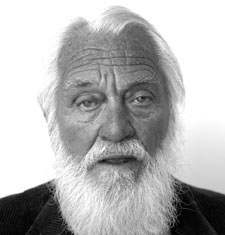UC Berkeley Press Release
Geographer David Hooson dies at age 82
BERKELEY – David Hooson, a professor emeritus at the University of California, Berkeley, and a scholar of the former Soviet Union and Eastern Europe, national identities and the history of geographic ideas, died on May 16 at the age of 82.
|
His work is said to have made a significant impact on geography within the Soviet Union, and his publications — including the books "A New Soviet Heartland?" (1964) and "The Soviet Union: A Systematic Regional Geography" (1966) — reportedly spurred passionate discussion in the Soviet Union.
"He made many forays into the region for research and collaboration with colleagues on the other side of the Iron Curtain; always open-minded, he was the exceptional Soviet specialist who was not a Cold Warrior," said former colleague Richard Walker, a UC Berkeley professor of geography.
Hooson joined UC Berkeley's geography department in 1966, served as chair of UC Berkeley's Center for Slavic and East European Studies from 1967-1970 and chaired the geography department from 1970 to 1975. As chair of geography, he led an effort to diversify the department and hired the department's first African American and female professors. He was awarded a Guggenheim Fellowship in 1976. From 1985 to 1986, Hooson served as the geography department's acting chair.
In addition, Hooson was the dean of social sciences at UC Berkeley from 1977 to 1980 and chair of the Academic Senate Committee on the Status of Women and Minorities from 1981 to 1982.
Hooson retired from UC Berkeley in 1997, but continued to teach here for three years. He later taught at UC Extension, Sonoma State University's Osher Foundation, and the University of San Francisco's (USF) Fromm Institute for Lifelong Learning. During USF's spring 2008 session, his humorously titled course, "What Does It Take to Dominate the World?" drew a pre-registration signup of 160 students.
Early years
Hooson was born on April 25, 1926 in the Vale of Clywd in North Wales. His widow, Cariadne Margaret Mackenzie-Hooson, said her husband's fascination with geography began at the age of 10. That is when H.J. Fleure, a Welsh professor of anthropology and geography, came to the Hooson family farm in the Vale of Clywd in North Wales on a research visit.
"Instead of focusing on David's father as a Welsh peasant, Fleure spent his time talking to David, whom he inspired with fascination for the world beyond the valley," she said. The two continued their communications through letters for many years.
The family farm and its 500-year-old home engaged Hooson in geography in numerous ways, said Mackenzie-Hooson. For example, because the farm was located under a flight path to Liverpool, which was the target of numerous World War II bombing raids, it heightened his awareness of the intersection of the physical and political. Also during the war, Hooson's father accepted at the farm Italian and German prisoners of war not considered escape risks, and Hooson became acquainted with people from lands well beyond his native Wales.
"Geography for David — and I think all geographers — is far more than about location in itself," she said. "It is about the interactions of places and peoples, the interconnections of the physical environment and the human actions on it. Geography is the discipline that integrates these aspects that each may be studied by specialists: it gives the bigger picture."
During World War II, Hooson served as a weatherman with the British Navy and was dispatched to Lord Mountbatten's headquarters in Sri Lanka and India. In 1945, he was sent on an expedition to Malaya to invade what today is part of Malaysia. "Instead of landing to face a battle with the Japanese, they were met by beautiful girls with trays of mango, papaya and pineapple," said Mackenzie-Hooson.
Hooson earned his B.A. and M.A. in geography at Oxford University in 1948 and 1950, respectively. He received his Ph.D. in geography in 1955 at the London School of Economics. Before coming to UC Berkeley, he taught at Glasgow University, the University of Maryland from 1956 to 1960, and the University of British Columbia from 1960 to 1966.
Hooson was chair of the Commission on the History of Geographical Thought for the International Union of the History and Philosophy of Science and the International Geographical Union (IGU). He wrote dozens of articles on the Soviet Union and East Europe, and was active in professional circles, joining fellow specialists at annual meetings of the Association of American Geographers, the Institute of British Geographers, the American Geographical Society and the IGU.
'Consummate Brit'
Hooson was known by family, friends, and colleagues for his immense knowledge of international affairs, his good humor and light-heartedness, and a fondness for dancing to big band music. Walker called Hooson a "consummate 'Brit' of the old school: convivial, soft-spoken, witty and gracious."
"He was a wonderfully warm-hearted, loving man who valued kindness above everything," said Mackenzie-Hooson. "He left life with the loose ends tied up, his family at peace. Several people have said that he had given us what we needed."
In addition to Mackenzie-Hooson; Hooson is survived by a son, Roger Hooson of Berkeley; a daughter, Claire Hooson of Belmont, Calif.; a brother, John Hooson of Wales; a sister, Helen Wright of England; and a previous wife, Alison Rayner-Hooson of Point Richmond, Calif.
The family is asking that memorial contributions be made to the Friends of the Fromm Institute, 2130 Fulton St., San Francisco, CA, 94117.
A scattering of ashes is set for June 21 at Shell Beach, and a campus memorial at UC Berkeley's Faculty Club is tentatively planned for late August or early September. The Royal Geographical Society also is planning a memorial in London in mid-September.


